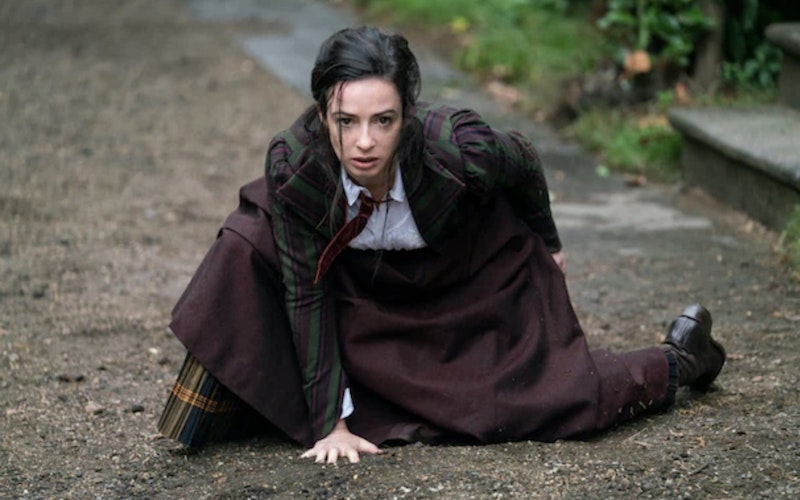
TV
The Nevers and Frustrated Faith
Editor’s note: This post contains spoilers for first six episodes of The Nevers.
“God makes his plans, so here we are.”
In the mouth of Molly (Laura Donnelly), a young woman in late-Victorian London, those words sound more like a sigh of resignation than a declaration of faith. In episode six of HBO’s The Nevers, Molly initially utters them after realizing that her low social standing precludes her marriage to a kind nobleman. She weds instead a crude butcher called Thomas True (Daniel Hoffmann-Gill) and repeats the phrase after her second miscarriage. When True dies, leaving his widow with debts to pay and an ailing mother-in-law to serve, Molly resignedly observes, “God makes his plans, so here we are.”
Every time Molly says this, Donnelly lets a little more sadness creep around her eyes, dipping the words deeper into a pool of despair. As composer Mark Isham’s mournful cello ushers viewers through scene after scene of Molly’s suffering, we come to understand that the God of this series may make plans, but they are capricious at best and callous at worst.
Although no character before Molly put it so plainly, God has seemed aloof in every episode of this science-fiction series, which follows a group of Londoners who gain superpowers from spores showered down by an alien spaceship. Once-dismissed women and people of color gain the ability to see the future, shoot flames, and compel others to tell the truth. Now feared and exploited, these people (dubbed “the touched”) struggle to survive until they’re given safety and a mission by Molly—who, in every previous episode, we’ve known as Mrs. True and who does not have a demure attitude.
As opposed to Molly, who spouted spiritual platitudes, this Mrs. True is a serious woman. The series’s first five episodes occasionally hint at Mrs. True’s backstory, suggesting that she knows more about the alien visitors (called the Galanthi) and is carrying out some secret mission. When her friend and partner Penance Adair (Ann Skelly), an Irish Catholic, makes a declaration of faith, Mrs. True usually scoffs and turns her attention to more practical matters.
God has seemed aloof in every episode of this science-fiction series.
It’s a confusing watch, one that requires a great deal as much faith from the viewer as it does of the characters. But director Zetna Fuentes and writer Jane Espenson make that confusion into a strength for episode six of The Nevers, which is the mid-season finale (the show’s return date has not yet been set). Even before we’re introduced to Molly, the exasperated version of Mrs. True, the episode opens in the far future, where a team of soldiers breaks into a space station. We recognize neither the setting nor the characters, all of whom speak in impenetrable future jargon.
But with the help of subtitles (and knowledge of sci-fi tropes), one can decipher the plot: the soldiers, led by Stripe (Claudia Black), have come to rescue a Galanthi from a totalitarian human regime. In a desperate move, the Galanthi sends Stripe’s consciousness back in time to prevent the empire’s rise. Her landing site? London 1890, into the body of Molly True, who gave into her despair and drowned herself in the Thames. Now in the body of this disparaged commoner, Stripe takes on the name Mrs. True and develops a prim and severe attitude to do battle against those who will destroy humanity’s future.
In the episode’s climactic scene, which explains the connection between Stripe, Molly, and Mrs. True, we understand the despair of all involved. Despite the millennia separating them, both Stripe and Molly had experienced too much to believe in a meaningful life, much less a loving higher power. Whether in the 19th century or the far future, the rich stay powerful by exploiting others, reducing the existence of most to joyless toil. Not even luminous aliens can free us from humans who wield guns, laws, and economics against one another.
Although it’s tough to admit, every Christian can see themselves in Molly’s tired tone. Some of us even know the anger seared across Stripe’s face when she realizes that she’s stuck in the body of a frail Victorian suicide victim. No, none of us have been sent through time by aliens, but we have all felt that God has given us a purpose, only to have that purpose taken away or frustrated.
In fact, so common are these experiences that they make up a good chunk of the Psalms. In Psalm 88, the author contrasts declarations of God’s goodness (“Lord, you are the God who saves me”) with desperate cries (“day and night I cry out to you”). Throughout the poem, the psalmist grows angrier, accusing God of actively harming them (“Your wrath lies heavily on me”) and callous disregard (“Why, Lord, do you reject me”). Psalm 88 ends with questions; the author can’t even muster Molly’s listless declaration of faith.
For Christians experiencing anger and doubt, Psalm 88 is incredibly comforting. More than the actual words of the poem, we're comforted that God allows such feelings, that anger and disappointment and doubt are as much a part of the Christian walk as psalms about faith and praise. It may not be pleasant to have these feelings, but the inclusion of Psalm 88 reminds us that God hears them.
Despite its fantastical conceit, The Nevers's portrayal of Stripe/Molly/Mrs. True reflects the Christian walk, in all its beauty and suffering. In Molly's recitation of faltering faith, we see our doubt. In Stripe's anger at being sent to the past, we see our frustration. And at the end of the episode, when a defeated Mrs. True finds herself welcomed and comforted by friends, we're reminded of times when our faith has been restored by other Christians, who know what it's like to doubt and rage and, sometimes, believe.
Topics: TV